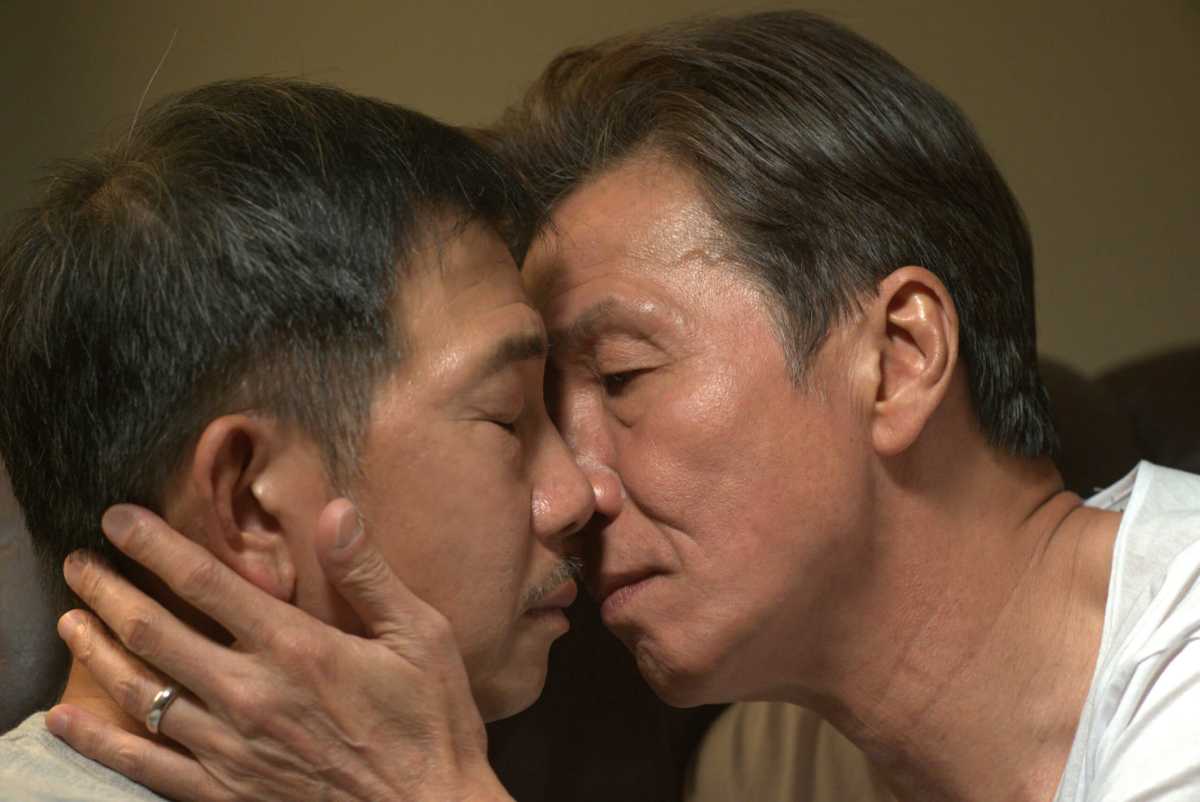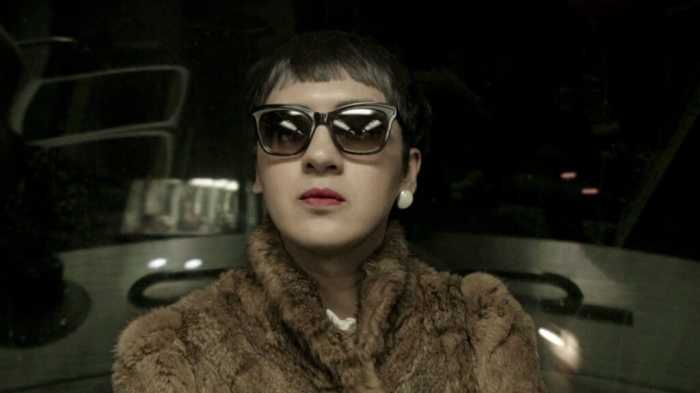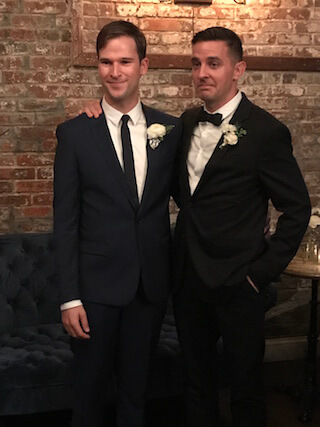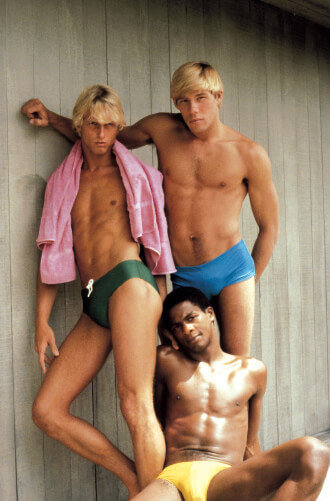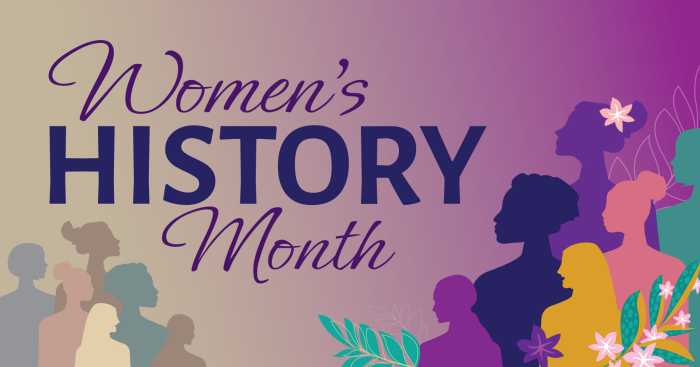NewFest, New York’s LGBTQ Film Festival, is alive and well, despite COVID, and will largely be streamed virtually, with moviegoers avle check out the 120 features, documentaries, shorts, and episodic programming from the safety and comfort of their living rooms. And like the New York Film Festival, there are a handful of drive-in screenings, as well.
The festival opens October 16 with a chance to see the highly anticipated “Ammonite,” by out gay director Francis Lee (“God’s Own Country”), starring Kate Winslet and Saoirse Ronan as lovers in 1840s England. It closes 11 days later with the award-winning “No Hard Feelings,” which chronicles the relationship that develops between Parvis (Benny Radjaipour) a gay Iranian who was raised in Germany, and the siblings Bana (Banafshe Hourmazdi) and Amon (Eidin Jalali), whom he befriends in a detention center where he works. The film depicts Parvis’ romance with Amon — who wants to keep things secret —and Bana’s concerns about deportation. The attractive cast provides a strong sense of what life is like for people forced to live in such limbo.
The at-home version of NewFest does have its advantages — folks are less likely to get shut out of a film that might sell out in a theater, and one can pause for a bathroom break, or rewind and watch a scene again and easily catch a missed line of dialogue (each film has a premiere time and is then available for streaming during the remainder of the festival; except where noted, all films reviewed are available as of Oct. 16, 10 a.m.). But it also sad to miss the communal experience of seeing a film with friends in a theater on a big screen and being able to talk about it together when it’s over.
Here are some highlights (and a few lowlights) from this year’s program.
The Latin American films are strong. Two Brazilian imports are sure to generate smiles and sexual excitement, respectively. The fabulous “Alice Júnior” is a fun, fast-paced comedy about the title character (Anne Celestino Mota), a never-been-kissed trans teenager who moves with her father Jean Genet (Emmanuel Rosset) to a small town. Alice isn’t happy, and even less so when she is told to dress as a boy at school. But she is feisty, and viewers will delight in watching her become empowered while lobbying for bathroom rights, fighting off bullies, and raising feminist consciousness.
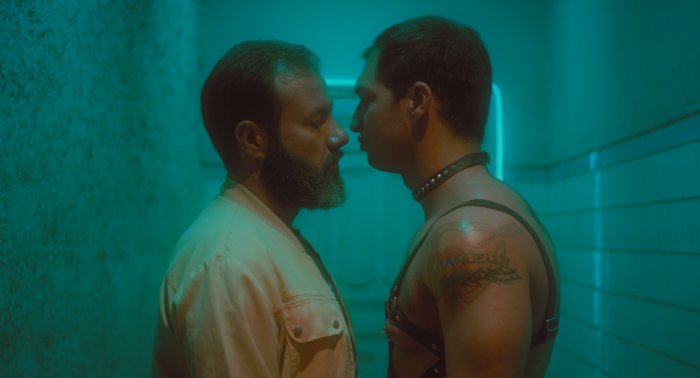
Viewers of “Dry Wind” will likely become obsessed with Maicon (Rafael Teóphilo), the smoldering, leather-clad lust object of Sandro (Leandro Faria Lelo), a factory worker in Brazil. The problem is that Sandro is sexually involved with Ricardo (Allan Jacinto Santana), and Maicon is interested in Ricardo, as well. This gorgeously filmed drama plays like a hothouse porno, complete with an unsimulated fellatio scene in a nightclub and a hot encounter with a tattooed muscled cop.
Another don’t-miss film is the Chilean entry “The Strong Ones” by Omar Zúñiga Hidalgo, whose 2015 short, “San Cristóbal” formed the basis for this feature. Lucas (Samuel González) pays a visit to his sister in Niebla, a coastal town, and meets Antonio (Antonio Altamirano). The attraction between the two men is electric, and they soon become lovers. Their stolen kisses and sex scenes are hot because the actors — who co-starred in the short — have tremendous chemistry; viewers will melt just watching these guys gaze at each other. But their relationship may be temporary as Lucas is heading off to Montreal for graduate work. “The Strong Ones” may be a familiar romantic drama, but it is enhanced by the gorgeous, rugged setting and the two gorgeous leads.

Also from Chile is one of the NewFest’s two films about lesbians of a certain age. “Forgotten Roads” is a stirring drama about Claudina (Rosa Ramírez Ríos), a widow who moves in with her daughter Alejandra (Gabriela Arancibia) after her husband dies. Claudina soon befriends Alejandra’s neighbor, Elsa (Romana Satt), a gregarious woman who awakens the widow’s spirits much to Alejandra’s chagrin. This magical — and, at times, magical realist — film is slow but enchanting.

Likewise, in director Filippo Meneghetti’s poignant film, “Two of Us,” aging neighbors Nina (Barbara Sukowa) and Madeleine (Martine Chevallier) are secretly a couple. When circumstances separate the lovers, Nina contrives ways of reconnecting with Madeline. Meneghetti, making his feature debut, shoots many scenes in close-up, and this intimacy showcases Sukowa’s deeply moving performance as a determined woman in love. Chevallier is heartbreaking, expressing her emotions, sometimes just with her eyes.
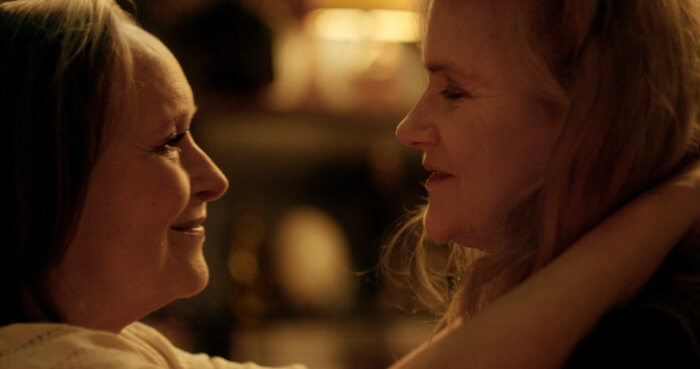
Another film about an older same-sex couple is one of the two gay Asian entries. Out gay writer/ director Ray Yeung’s gentle, bittersweet romance, “Twilight’s Kiss (Suk Suk)” is an elegiac drama about Pak (Tai-Bo), a taxicab driver, who meets Hoi (Ben Yuen) in a park where Pak was cruising. The closeted older men slowly embark on a friendship that soon turns into a sexual relationship. Yeung’s sensitive film captures the quotidian aspects of lives that undergo deep yet profoundly subtle changes. A shot of Pak and Hoi’s hands clasping or feet touching brims with genuine affection, and an episode where Hoi visits the home of his friend Chiu (Kong To), speaks volumes about loneliness and aging.

Also from Asia is writer/ director Hong Khaou’s thoughtful, reflective drama, “Monsoon” about Kit (Henry Golding), a gay man returning to Vietnam after three decades away. The reason for his journey becomes clear as Kit talks about family, war, and history with Lee (David Tran), his cousin, Lewis (Parker Sawyers), an American he starts dating, and others. Exquisitely filmed, “Monsoon” is full of quiet moments that let the impact of the characters’ memories and emotions resonate.
Another film with a homecoming theme is the absorbing “Rurangi” (starting Oct. 21, 8 p.m.). Caz (Elz Carrad) is a trans man whose life in Auckland comes crashing down after the death of his lover. He returns to Rurangi, his hometown, reuniting with his estranged father, Gerald (Kirk Torrance), as well as his ex-boyfriend, Jem (Arlo Green), and others who knew him a decade earlier. The experiences the likable Caz has coming out as trans and redeveloping his relationships forms the narrative backbone, but there are other mini-dramas — such as one involving a local environmental campaign Gerald is waging — that flesh out this involving drama.
Two feature films that also portray trans lives and feature pre-teens are screening at NewFest. The better film is “Cowboys,” a tender, heartfelt drama about a transgender preteen, Joe (Sasha Knight), whose father Troy (Steve Zahn) “kidnaps” his son to escape Joe’s not-so accepting mother (Jillian Bell). Their journey is the typical road trip with ups and downs — Troy is bipolar, the police are in pursuit — but the relationship between Joe and his supportive dad is affecting.
In contrast, “Gossamer Folds” is a well-meaning but wrong-headed film about Tate (Jackson Robert Scott), a precocious 10-year-old boy who moves to suburban Kansas City with his parents, Frannie (Sprague Grayden) and Billy (Shane West). Tate’s parents bristle at their transgender neighbor Gossamer (Alexandra Grey). But of course, Gossamer has the patience of a saint, and teaches the adults the life lessons of respect and tolerance they all need to learn.
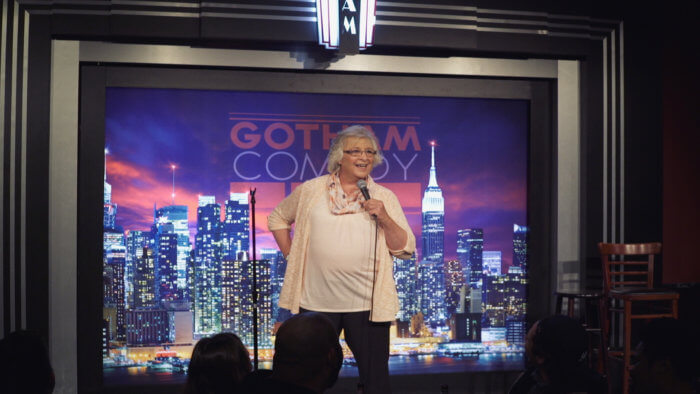
The documentary “Julia Scotti: Funny That Way” uses interviews, animation, and performance clips to showcase the personable transgender comedian Scotti, who was a finalist on “America’s Got Talent.” She describes standup as “opening your soul,” and likens it to the difficulty of living one’s truth. Scotti talks on and off-stage about her life before her transition, and she startles herself watching a clip of a transphobic routine she earlier performed as a man. This documentary also shows how Scotti has bonded with her son and daughter who were initially kept from her after she came out as trans. Scotti’s humor stems from her cockeyed outlook on life, and this film captures her well.
Other hot documentaries at NewFest include “Killing Patient Zero,” which aims to humanize Gaetan Dugas, who was dubbed “the man who brought AIDS to North America.” Director Laurie Lynd has friends and family members recall Dugas’ outgoing personality, while AIDS researchers and medical experts doing contact tracing champion his willingness to share information about his partners and provide blood samples. While the documentary acknowledges that Dugas resisted changing his behavior until proof showed that transmission occurred through sex, Lynd’s compelling film also demonstrates the negative impact of Dugas being demonized.
“Making Sweet Tea” an insightful documentary chronicling Dr. E. Patrick Johnson’s interviews with black gay men across the South about their lives. He published his findings in the book, “Sweet Tea,” but Johnson later developed a stage version. This film intercuts scenes of Johnson preparing his production with interviews with a half dozen of the men Johnson depicts on stage. The men discuss topics including coming out, race, interracial relationships, class, gender roles, family, the church, and HIV/ AIDS — with candor and sometimes cattiness. This compassionate documentary speaks to the value of telling these stories, and the voices resonate.
“Minyan” by out gay filmmaker Eric Steel, is set in 1986 Brooklyn, as Russian Jewish teenager David (Samuel H. Levine) helps his widowed grandfather Josef (Ron Rifkin) move into a retirement home where Itzik (Mark Margolis) and Herschel (Christopher McCann), a discrete gay couple, live. David is also secretly exploring his sexuality, sneaking out a gay bar, and eventually becoming intimate with the sexy bartender (Alex Hurt). Their sex scenes inject life in to this slow, subdued, and elliptical drama.
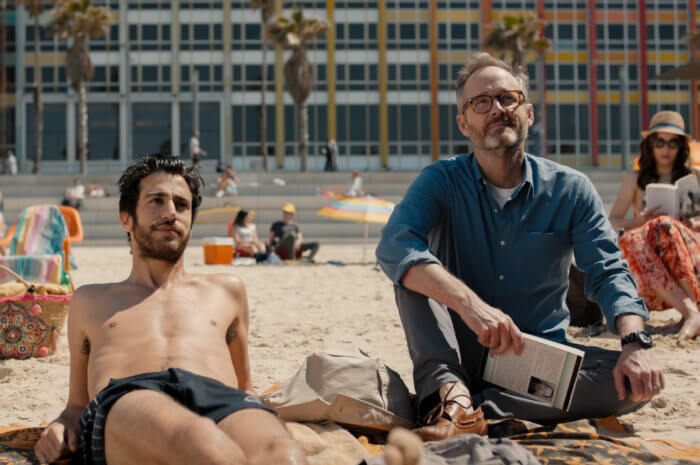
“Sublet” by out gay filmmaker Eytan Fox should have taken a cue from the sexual frankness of “Minyan.” Michael (John Benjamin Hickey) is a travel writer who sublets Tomer’s (Niv Nissim) apartment in Tel Aviv. However, Michael invites Tomer to stay when he realizes Tomer has nowhere to go. The two men, a generation apart, bond as they cohabitate, but most viewers will want them to just shut up and fuck. The drama may be contrived, but Hickey’s low-key performance is a pleasure to watch.
Another featuring focused on Jewish lives is “Shiva Baby” (starting Oct. 20, 8 p.m.), a squirm-inducing comedy about Danielle (Rachel Sennott), a bisexual college student who attends a Shiva with her parents (Polly Draper and Fred Melamed). There, Danielle runs into the two people she least wants to see—her ex, Maya (Molly Gordon), and Max (Danny Deferrari), the guy she is currently having sex with for money. Writer/ director Emma Seligman makes viewers as uncomfortable as Danielle, and Sennott’s performance is noble. In support, Draper gets off some amusing one-liners and Gordon exudes appeal at the affectionate and perceptive Maya.

Finally, NewFest offers viewers a sneak peek at the latest film by out gay writer/ director François Ozon, “Summer of 85” (starting Oct. 17, 8 p.m.). Alex (Félix Lefebvre) is a baby-faced teen who meets David (Benjamin Voisin) when Alex’s boat capsizes one afternoon. The two youths quickly become fast friends and couple up romantically. However, just as Alex is easily seduced by the handsome and charming David, he also becomes jealous. Ozon play out the mercurial dynamics in this intense coming-of-age/ loss-of-innocence drama.
NEWFEST | Oct. 16–27 | Tickets are $12; $95 for a full festival pass | newfest.org
To sign up for the Gay City News email newsletter, visit gaycitynews.com/newsletter.

